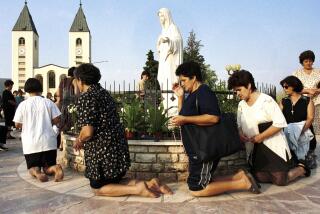U.N. Forces Fire on Somali Crowd, Fueling U.S. Debate : Africa: Gunmen use women and children as shields in clash with peacekeepers. Senators attack American policy.
- Share via
WASHINGTON — U.N. peacekeeping forces and American helicopters Thursday fired on a crowd of Somalis in a battle that killed substantial numbers of women and children, U.S. and U.N. officials said, raising new concerns here about the U.S. presence in Somalia.
The carnage came after scores of Somali gunmen, shielded by women and children--many of them apparently armed--attacked about 135 U.S. and Pakistani peacekeeping troops, killing a Pakistani soldier and wounding five Pakistanis and three American soldiers.
The U.N. troops then called in American Cobra helicopter gunships, which fired 20-millimeter cannon into the crowd to prevent it from overrunning the troops, U.N. officials said.
U.S. Army Maj. David Stockwell, the U.N. spokesman in Mogadishu, said the gunships fired as a “last resort” to keep the U.N. troops from being attacked by the mob, as they have been in previous clashes. The gunmen hidden in the center of such crowds usually are heavily armed.
The actual number of Somali casualties was not immediately clear. News agencies reported that residents of the area said as many as 100 Somalis were dead. U.N. officials said there was no confirmation, but conceded that civilian casualties were high.
The incident seems certain to add to growing concern in the United States about the tenor of the U.N. and U.S. peacekeeping mission in Somalia. It appeared to heighten the emotional element in the debate, prompting members of Congress to recall memories of the Vietnam War, where the distinction between enemy forces and civilians often was blurred, and the 1983 bombing of a Marine barracks in Beirut, Lebanon.
On Thursday, Congress launched its first formal attack on the Administration’s policy in Somalia as the Senate passed a resolution demanding that President Clinton present a detailed plan for continued U.S. peacekeeping efforts and later seek Congress’ approval.
The bipartisan measure, based on a stronger proposal by Sen. Robert C. Byrd (D-W.Va.), calls on the President to unveil his medium-term “game plan” by Oct. 15, and to seek Congress’ blessing formally 30 days later. Passage came on a 90-7 vote.
Byrd underscored his concerns by reading the Associated Press story of Thursday’s clash in Mogadishu.
“Women and children--according to the wire--have been killed by U.S. gunships,” he said. “Is that why our people are over there?”
Although the version of the resolution passed by the Senate is non-binding--and substantially diluted from Byrd’s original amendment--the wide support it attracted amounted to a slap at Clinton, who has been insisting that the Somalia operation must be continued.
Lawmakers have become dissatisfied with U.S. policy in Somalia because the nature of the peacekeeping operation there has changed. U.N. forces took over from U.S. commanders last May and the effort has turned into a test of wills between the United Nations and the dominant clan leader in Mogadishu, Gen. Mohammed Farah Aidid.
In all, eight U.S. soldiers have been killed in action in Somalia since American forces arrived last December. The fighting there has become more intense as Aidid has rallied his militia.
The killing of four U.S. soldiers in a mine explosion last month set off a flood of calls in Congress for Clinton to clarify U.S. policy in Somalia.
Defense Secretary Les Aspin sought to respond last month by promising that U.S. combat troops could be brought back from Somalia as soon as security is restored in Mogadishu, the warlords are disarmed and a national police force is set up.
And on Thursday, Gen. Colin L. Powell, chairman of the Joint Chiefs of Staff, added his voice to the debate, warning that a U.S. pullout would be devastating to “our ability to deal with problems” such as Somalia.
“I don’t think we should cut and run because things have gotten a little tough,” Powell said in an interview with the Associated Press. “I think we have to stay there for the foreseeable future to continue to play our part in the U.N. effort.”
But continuing clashes between U.S. forces and Aidid’s militiamen--combined with the continued success of the Somali general in eluding even the elite U.S. Delta Force sent to capture him--have heightened fears in Congress that the Somalia venture will become a quagmire.
Those concerns are also spreading into questions about Clinton’s assurances that U.S. troops would be sent to help enforce any peace agreement in Bosnia.
“I want the President to come up with a game plan,” Sen. Mitch McConnell (R-Ky.) told reporters. “It’s not so much a question of how many (troops) are there but what they are doing. If they are going to be fighting a war, then it ought to have congressional approval.”
Byrd’s original proposal would have required the Pentagon to pull U.S. forces out of Somalia within 30 days unless the Administration won congressional consent to keep them there. Withdrawal of U.S. forces almost certainly would lead to collapse of the U.N. operation.
But unexpectedly broad support for the Byrd proposition sent Senate Democratic and Republican leaders into daylong negotiations with White House staff members and Byrd in an effort to work out an acceptable compromise.
“We’ve already overstayed our original mission--we’ve completed it--it’s done,” Byrd told the Senate on Thursday. “There could be a lot of questions asked. One of them is likely to be: ‘Why isn’t Congress speaking up?’ ”
More to Read
Sign up for Essential California
The most important California stories and recommendations in your inbox every morning.
You may occasionally receive promotional content from the Los Angeles Times.










